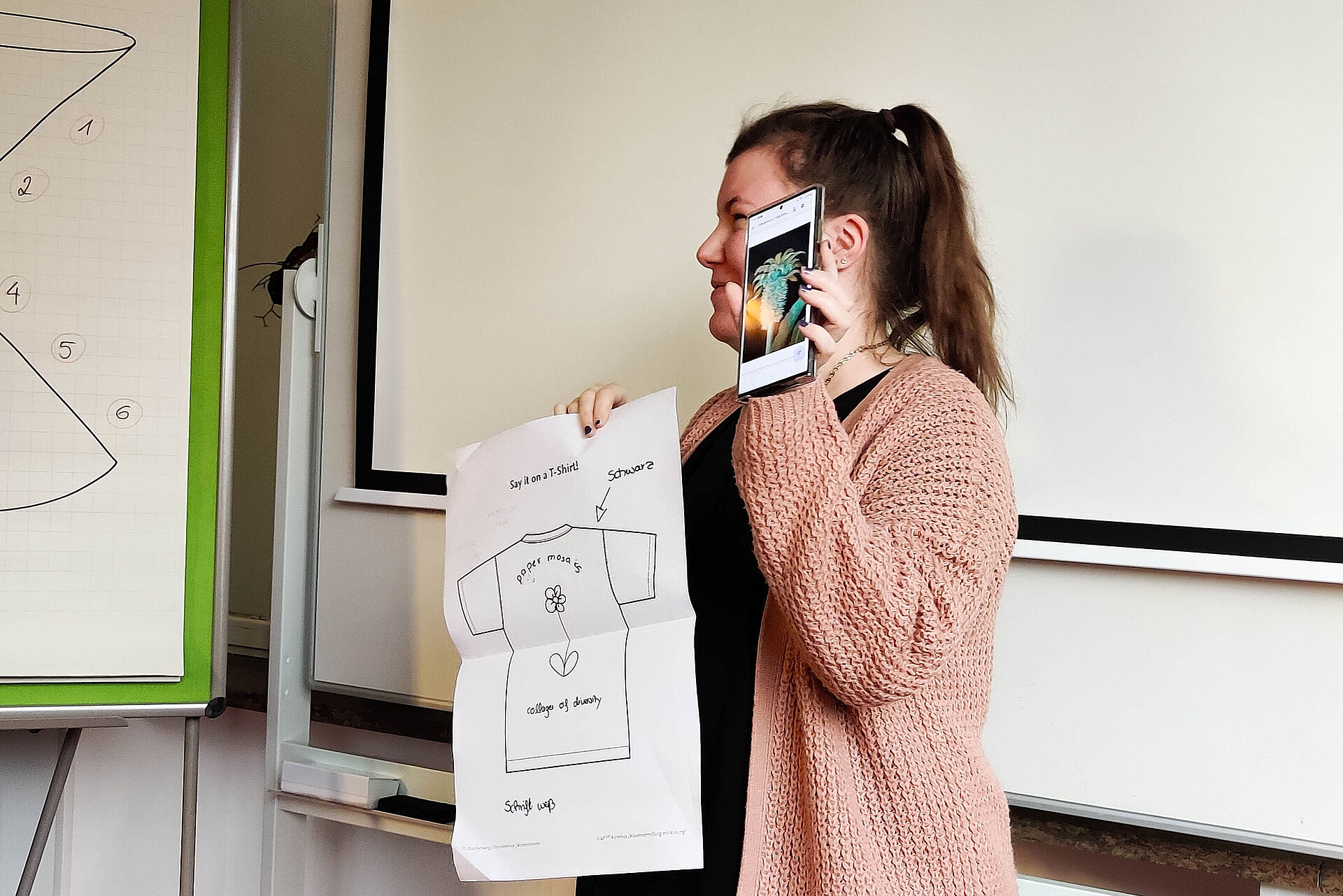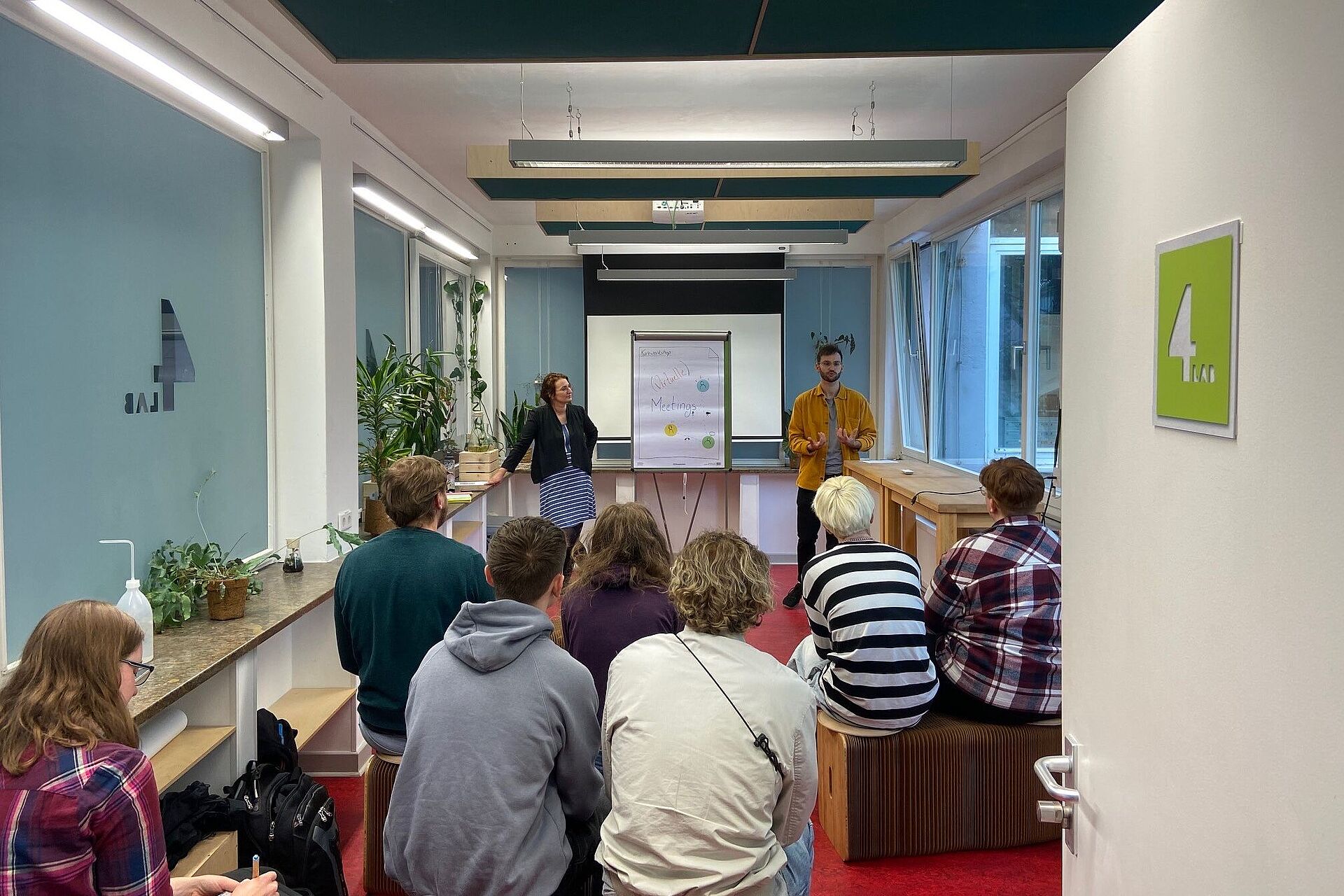
► Knowledge transfer with impact: trying out new creative techniques
We offer workshops for the development of career-relevant key qualifications as part of GradTUBS. In the workshops, we impart knowledge about the conception of target group-orientated impact projects. The workshops take place in April and November. Here you can find more information about the previous workshop on 14 November 2025.
Twice a year, following the workshop "Knowledge Transfer with Impact", the Call for Impact is announced. This funding from the Transfer Service gives all PhD and postdoctoral researchers at TU Braunschweig the opportunity to plan and implement their own impact projects with social groups and organisations in a multidirectional and co-creative way. This allows them to enrich their own research with new ideas and perspectives.
Up to three PhD impact projects are funded twice a year with up to €1,000.
A handout with further information can be found in the download area. The application deadline was the 19th of December 2025 and you could apply alone or in a team. When applying, participation in the GradTUBS training course "Knowledge Transfer with Impact" is not mandatory, but an advantage.
The application for the next funding period will start Mid April.
With TechHeritage, doctoral student Clemens Janke from the Institute of History aims to preserve and (re)activate the material cultural heritage of TU Braunschweig by cataloguing the "Technical Heritage" collection, the "Measurement Technology Collection" of the Institute of Geodesy and Photogrammetry, and the "Teaching Card Collection" of the Institute of History.
Through intergenerational exchange between the academic and non-academic groups involved in the project in a citizen science format, knowledge that has only been developed and made accessible through scientific examination of the collection objects is shared with future generations.
A preliminary course and an interdisciplinary workshop (in April 2026) will form the content and methodological framework for the exhibition of the collection objects (July 2026). The project will conclude with a publication Interaction with the collection objects reveals historical interconnections between the city, economy and science, while also opening up new intergenerational opportunities for an equal, multifaceted and conscientious future.
Sustainability is not only taught through additional content, but also through the perception of sustainability-related situations in educational activities. The decisive factor is whether teachers recognise when an opportunity arises.
This is where the project by Yulia Edeleva and Gina Do Manh (Institute of German Studies, TU Braunschweig) comes in. A new professionalisation format for the "BNE Safaris" is being developed: with the help of a structured map system and an optional AR-supported observation environment, teachers can identify teaching situations in which ecological, social, economic or ethical issues arise implicitly or explicitly. These moments are documented and utilised for reflection and professional development processes.
The aim of the project is to reduce the so-called belief-practice gaps, i.e. the discrepancies between teachers' sustainability-related beliefs and their concrete implementation in the classroom. In addition, the project aims to systematically strengthen institutional learning processes through immersive reflection formats. In addition to school contexts, language education, adult education and international continuing education formats are also included. The project thus opens up prospects for a scalable, transferable internationalisation strategy in the field of sustainability-oriented education.
Land.Komm.Digital addresses the issue of participation in rural areas often coming to nothing: communication channels provide information, but too rarely encourage actual participation. In a design workshop with local stakeholders, specific communication formats are therefore developed to promote participation.
These results are used to create a practical toolkit with design principles that is tested in several organisations and refined iteratively after a few weeks based on a brief impact assessment. This process is scientifically supported by the Chair of Service Information Systems at the Institute for Information Systems.
The aim is to have a demonstrable and tangible impact on communication practices: a more participatory approach that strengthens self-efficacy, promotes engagement and thus provides sustainable support for social participation in rural areas.
Bringing research into society and enriching one's own. This was the theme of PhD Impact Day on the fourth day of Impact Week. The Institute for Intermodal Transport and Logistics Systems inspired 11th grade students from the Neue Oberschule Braunschweig in a programming workshop, while cultural figures and committed individuals from rural areas spoke in a forum led by Ludger Voigt from the Institute for Organisation and Leadership, on the possibilities of participatory theatre, and Dr Schulz-Lehnfeld from the Institute for Architectural History offered a discussion course on the topic of monument preservation.
How can cultural infrastructure in rural areas be established, maintained and developed in the long term?
The project by Ludger Voigt, PhD student at the Institute for Corporate Management and Organisation, and Julia Beideck, PhD student at the Department of Cooperatives at the University of Cologne, in collaboration with the theatre cooperative Traumschüff e.G., is dedicated to this question.
The aim of the project is to show how cultural services can be provided in rural areas and at the same time enable cultural participation. In addition, the project examines how cultural offerings can promote social exchange in rural regions - especially in places that have not had access to theatre to date.
With PORT-O, PhD student Cindy Demuth from the ITL is developing an interactive learning setting that gets girls interested in STEM subjects. A simulated harbour hinterland scenario is created on a mobile table using Lego, in which Ozobots are programmed to playfully implement real logistical challenges.
In workshops at schools, girls in particular learn through practical programming tasks and direct insights into research that technology and logistics are not male domains.
PORT-O thus combines the early promotion of young talent with the aim of making sustainable transport solutions visible and tangible - and boosts the self-confidence of young women to go their own way in engineering.
The social relevance of "Questions of building research and monument preservation" will be explored using examples from the Institute of Architectural History's research projects on libraries, churches and a school. Research methods and interim results will be discussed in a workshop with keynote speeches, an exhibition and an information trail.
What aspects of the projects will be considered in terms of a shared responsibility for the built heritage? The aim is to strengthen the perception of the project results in the community, to recognise the values of the built environment and to ensure the preservation of knowledge about building as a shared cultural heritage for future generations.

Workshop as part of the “MeetingHacks” impact project at 4LAB
Post-doctoral student Marie Ritter and doctoral student Darien Tartler from the Department of Work, Organizational and Social Psychology at the Institute of Psychology want to develop MeetingHacks, a short content video format that prepares tips from meeting research for practical use. The videos will be presented to people from companies and start-ups as well as students, their needs will be discussed in a workshop and new impulses will be fed back into research. The knowledge gained from the MeetingHacks can thus be applied directly in everyday working life. This project is co-funded by the Braunschweigischer Hochschulbund e.V.
Research assistant Ayat Tarik from the Institute for the History and Theory of Architecture and the City (GTAS) is planning to work with two master's students, Jennifer Baus and Burcu Daglayan, in a so-called KO:Lab to jointly develop and test participatory methods for implementing low-threshold participation formats in the Schwarzer Berg district of Braunschweig. With their project, they are committed to sustainable urban development geared towards the common good, in which opportunities for participation and co-determination in urban design processes are promoted. The aim is to strengthen identification with the place and the neighborhood for everyone who lives or spends time there.
Promoting sustainable construction through collaborative exchange is the aim of the impact project by post-doctoral student Sandra Rothenbusch from the Department of Work, Organizational and Social Psychology at the Institute of Psychology. The idea of the project is to bring together players in the construction industry through “speed dating” and “fuck-up events” on the topics of “sustainable construction” and “sustainable collaboration”, thus enabling discussions and exchanges of experience as well as approaches to solutions on these topics. The results of the discussions are to be recorded visually using note sketching and shared via social media.
In her research, PhD student Grace Abou Jaoude from the Institute for Sustainable Urbanism (ISU) plans to develop a web-based tool that analyses and visualizes different scenarios for the reintegration of urban production in order to investigate their impact on resource efficiency. The tool will provide evidence-based information on potential benefits for local manufacturers and their production networks to become more integrated into urban production.
The Call for Impact jury uses an evaluation form to jointly decide which PhD Impact projects will receive funding in the respective period. The criteria are social relevance and impact, reach, research relevance and sustainability, as well as innovativeness and the overall impression.
Christian Stascheit
Coordination of Engagement and Impact Projects
Transfer Service
Julia Willich
Sustainability Officer
Digital Transformation and Sustainability
Gina Kerber
Impact Learning Coordination
Transfer Service
Dr. Inga Schepers
National Funding Advice
Research Services
The Call for Impact is announced twice a year. The exact application phases will be announced in good time and will take place in the middle and end of the year.
PhD Impact-Projects aim to have an impact at the societal level. Doctoral students and postdocs share their knowledge of current research with target groups and enrich it through mutual exchange. Many topics are suitable; please contact us if you have any questions.
Vacancies of TU Braunschweig
Career Service' Job Exchange
Merchandising
Term Dates
Courses
Degree Programmes
Information for Freshman
TUCard
Technische Universität Braunschweig
Universitätsplatz 2
38106 Braunschweig
P. O. Box: 38092 Braunschweig
GERMANY
Phone: +49 (0) 531 391-0
